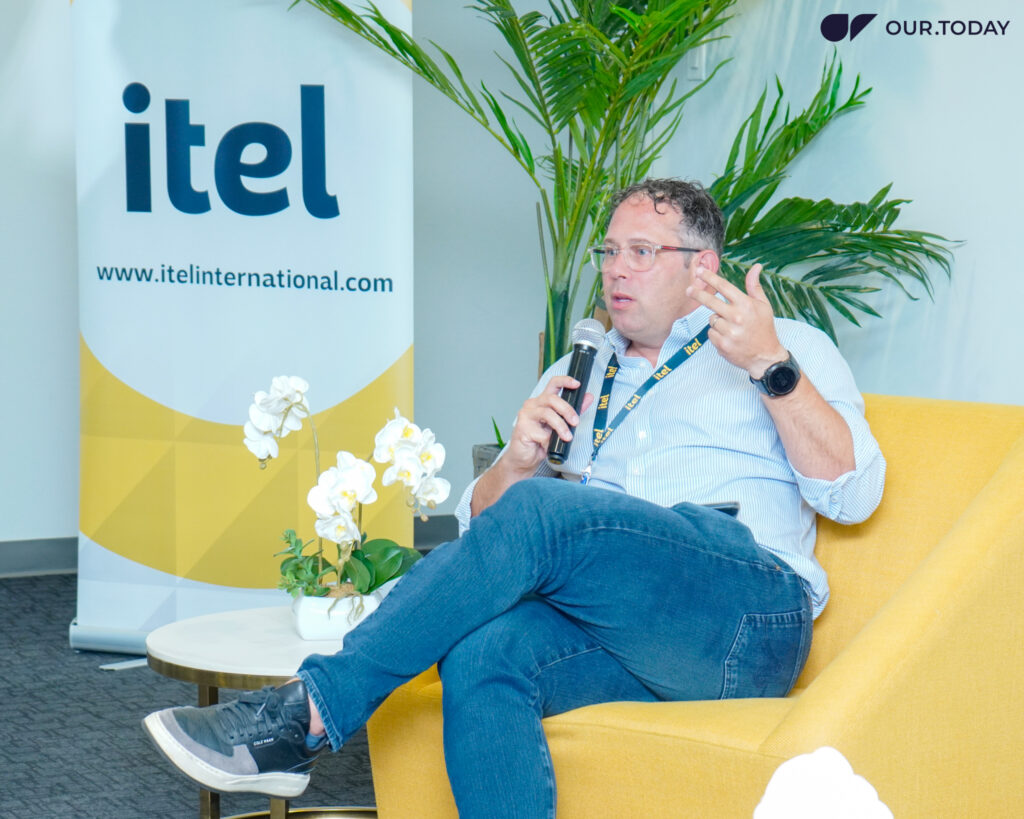

Founding chairman and CEO of itel International Yoni Epstein sought to allay fears that artificial intelligence (AI) and its by-products will replace human labour in the business process outsourcing industry, otherwise called the global services industry.
Rather, he explained that the technology enhances the performance of employees in the industry, enabling the creation of “superagents”.
Speaking at the launch of itel’s newest AI-enabled innovation, itelligence®, on Tuesday, October 14, at the company’s Chalmers Avenue location, Epstein said, “We are using AI to make our business more efficient. It’s about adopting, adapting, evolving and utilising technology to take the business to the next level.”
The itelligence® platform will enhance efficiencies within the contact centre operations and improve the performance and capabilities of its agents. The technology was developed in-house with tech consultant Knightfox App Design Ltd to reduce the use of multiple third-party solutions to meet clients’ regulatory requirements.

With the platform, itel’s ability to fine-tune the technology and train the AI to transcribe and analyse call data from conversations with Caribbean accents is significantly improved. As such, the company has a greater level of accuracy in data analysis and insights produced by the itelligence® platform, moving from 2 per cent of call monitoring capabilities to 100 per cent and improving its competitiveness.
On the other hand, using plug-and-play, off-the-shelf software would not have yielded such a result.
“So our accuracy went from where most of these companies are counting at 80 per cent to about 96 per cent accurate, which means good data in, good information coming back out at you. And when you look at that and the information you’re getting back, you’re immediately getting what we would call a voice of the customer because you’re now having the sentiment of what that customer is saying, and not just what you think that person, what your agent is saying to that customer,” Epstein explained.
“So you’re getting the sentiment analysis as to how the call went, what the customer dealt with. You can pull data to see what is the most frequent reasons they call, why are they calling, are they getting first-call resolution, and things of that nature. So you’re able to find out more and work with that agent and develop that agent faster,” he continued.
Beyond using the data to address customer relations concerns, itelligence also transmits the data to the company’s training and development platform to address gaps identified during the interactions between the agents and clients.

“And that’s AI really working in the background to make you more efficient, to give you information faster, to provide a better service and more value-added to our customers at the end of the day,” Epstein said. “When we look at transitioning this… again, you’re taking those QA [quality assurance] agents, you’re not going to turn them into developmental agents; you’re going to turn them into supervisors, you’re going to turn them into managers, taking them higher up the value chain within the organisation, but you’re able to provide way more for your customer today than we did yesterday.”
Epstein pointed out that the company must evolve with technology to avoid being left behind in a dynamic industry that has seen employment grow from 12,000 in 2012 in Jamaica to over 60,000 people. Delving deeper into the employment figures, the past president of the Global Services Association of Jamaica (formerly Business Process Industry Association of Jamaica) and former chairman of the Global Services Sector Project argued that the decline in workers in the industry was not the result of AI’s disruption.
“When you look at the advancements in AI, a lot of people talk about the loss of jobs, but in the last 24 months, the loss of jobs that you may have seen in Jamaica, or the replacement of jobs, is really just a resetting of the industry,” Epstein shared, noting that North American companies are trimming expenses because of tighter financial constraints. “It actually has nothing to do with the AI. It has a lot to do with the cost of doing business in Jamaica. This is why we have looked at investing our time and energy and resources into developing intelligence because AI is more than just voice,” he continued.
Though not identified as artificial intelligence, itel has been automating its operations since 2018, supplying voice and digital messaging support for an established US telecommunications and media company. Aside from helping itel manage multiple phone calls, artificial intelligence allows the outsourcer to expand its services nimbly while generating insights into clients’ business. The founding chairman added that AI has been integrated into managing and supporting itel’s cybersecurity capabilities.






Comments